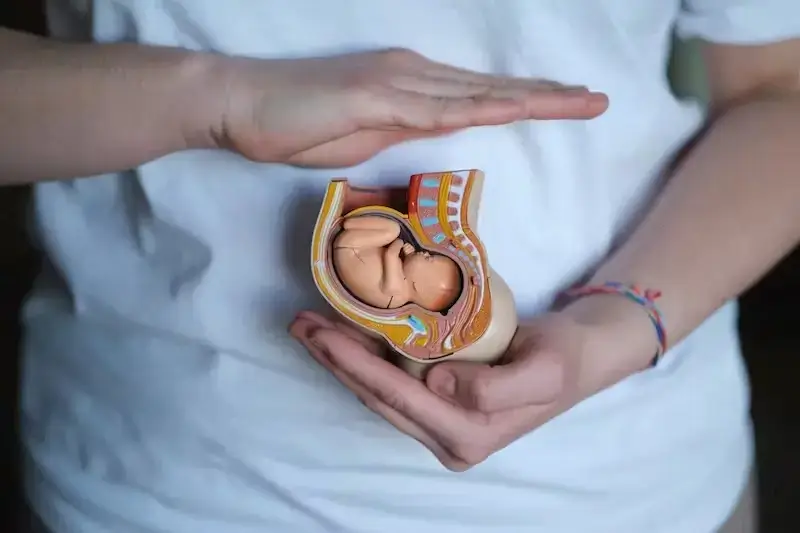
At 15 weeks pregnant, your fetus is growing rapidly and starting to look more and more like a human being. Your baby can sense light and hear you singing, and you can find out whether you have a boy or a girl on your next ultrasound scan.
Related: Why I am Having Nosebleeds During Pregnancy?
15 Weeks Pregnant – Fetus

At 15 weeks pregnant, your fetus is about the size of a navel orange, measuring about 4 inches long and weighing around 2.5 ounces. The fetus is still covered in a layer of fine hair called lanugo, which helps regulate its body temperature. The skin is still thin and translucent, and blood vessels are visible through it.
The fetus’s bones are also starting to harden, and its muscles are getting stronger, allowing it to move around more. By this point, the fetus can make a variety of facial expressions, including frowning and squinting. Its ears are in their final position, and the fetus can hear some sounds from outside the womb.
The fetus’s digestive system is also developing rapidly, with the intestines starting to produce meconium, a sticky, black substance that will be the baby’s first bowel movement after birth. The liver is also producing bile, which is necessary for digesting fats.
Related: Pregnancy Belt – Function, Types and When to Buy ?
15 Weeks Pregnant – Symptoms
You are now 15 weeks pregnant, and you’re one step closer to meeting your little one. At this stage, you may still be experiencing some pregnancy symptoms, although they might be different from what you felt a week ago.
If you’re lucky, your morning sickness may have disappeared entirely by now, and you’ll feel less exhausted and less emotional. You might also notice that your belly is growing, and you’re starting to look more pregnant. However, this growth might start to cause some mild back pain or discomfort.
While some symptoms may have disappeared, others may still persist. You may continue to feel bloated or gassy, and you might experience mild cramping in your lower abdomen as your uterus continues to stretch and grow.
Another common symptom at this stage is pregnancy rhinitis, which may cause your nose to feel stuffy and congested. This occurs due to increased blood circulation to your nose, which causes the mucous membranes to swell.
In addition to the above symptoms, you may also experience occasional headaches or lightheadedness. These symptoms are typically normal and not cause for concern.
At this time, your baby is growing at an incredible pace and needs all the nutrients it can get. That means you’ll likely start to put on a bit more weight than you did during the first trimester. To make sure you’re both getting the nutrients you need, doctors recommend adding around 300 extra calories to your diet each day, which can lead to a weight gain of about 1 pound each week. And while you might be tempted to indulge in all your favorite snacks, it’s important to make sure you’re eating a healthy and balanced diet, packed with plenty of fruits, veggies, lean proteins, and whole grains.
Your uterus will have moved up to the halfway point between your pubic bone and your belly button. If you gently press down on this area, you might even be able to feel it! It’s an amazing reminder of how your body is changing to create a little human being, so take a moment to marvel at the wonder of it all.
Overall, if you’re feeling good, it’s a great time to start or continue a healthy exercise routine. Staying active during pregnancy can help you feel better and may even help with labor and delivery.
Related: Bleeding During Pregnancy: What’s Normal and What’s Not
15 Weeks Pregnant – Questions
1. What Should I Expect During my Prenatal Appointment?
During your 15-week prenatal appointment, your healthcare provider will likely perform routine tests and procedures to ensure the health of you and your developing baby. These may include a physical exam to check the growth and development of your baby, blood tests to screen for anemia, infections, and other health conditions, a urine test to check for protein, sugar, and signs of infection, and an ultrasound to confirm your due date and check your baby’s growth and development. Your provider may also offer prenatal screening tests to assess the risk of genetic disorders or other complications.
Additionally, your provider will discuss your overall health and well-being, including any symptoms or concerns you may have, and provide advice on nutrition, exercise, and other lifestyle factors that can impact your pregnancy. Remember to ask any questions you may have and share any concerns with your healthcare provider to ensure a healthy pregnancy for you and your baby.
2. Can I Feel my Baby Move?
It is possible to feel your baby move at 15 weeks, although it’s more likely to happen later in your pregnancy. This early in your pregnancy, your baby is still relatively small and may not be moving around as much as later on. Additionally, if this is your first pregnancy, you may not recognize the sensation of your baby’s movements right away.
However, some women do report feeling fluttering or a “butterfly-like” sensation in their abdomen around this time, which could be their baby moving. If you’re not sure what you’re feeling, try paying close attention to your body and see if you notice any patterns or movements that could be your baby.
3. Can I Have Sex?
In most cases, it is safe to have sex at 15 weeks pregnant. As long as your pregnancy is healthy and your healthcare provider hasn’t advised you otherwise, there’s no reason to avoid sexual activity.
However, it’s important to keep in mind that some women experience discomfort or changes in their libido during pregnancy. Additionally, certain positions may become more difficult or uncomfortable as your belly grows. It’s important to communicate with your partner and try different positions that feel comfortable for both of you.
If you have a high-risk pregnancy or have experienced complications such as bleeding or preterm labor, your healthcare provider may advise you to avoid sex or other activities that could put stress on your body.
As always, it’s important to listen to your body and communicate any concerns or discomfort with your healthcare provider. They can provide guidance and support to help ensure a safe and healthy pregnancy for you and your baby.
4. Can I Jump on a Trampoline?
Jumping on a trampoline at 15 weeks pregnant is not recommended by healthcare professionals due to the increased risk of injury and falling. The changes your body undergoes during pregnancy, such as loosening of ligaments and increased weight, can make jumping on a trampoline particularly dangerous. Instead, consider low-impact exercises like walking, swimming, or prenatal yoga, and always consult with your healthcare provider before starting any exercise routine during pregnancy.
5. What Foods Should I Avoid?
You should avoid certain foods, including raw or undercooked meats, fish with high levels of mercury, and unpasteurized dairy products. You should also limit your intake of caffeine and avoid alcohol.
6. What Can I do to Relieve Constipation?
You can relieve constipation by drinking plenty of water, eating high-fiber foods, and exercising regularly. You may also want to talk to your doctor about using a stool softener or laxative.
7. Do I need 15 Weeks Pregnant Ultrasound?
It’s possible that your doctor won’t schedule you for an ultrasound this week, especially if you’ve already had one in the first trimester. However, if your pregnancy is considered high-risk, you might still have an ultrasound on the books. If your doctor suspects any potential complications, they might recommend an amniocentesis between weeks 15 and 20. This involves using ultrasound to guide a thin needle into your uterus to collect a sample of amniotic fluid, which will later be tested for genetic disorders like Down syndrome.
If you do end up having a 15-week ultrasound, there’s a chance that your doctor could reveal the gender of your baby. But keep in mind that the baby’s position can sometimes make it hard to see external genitalia. If this happens, don’t fret! Your doctor will simply try again at your next ultrasound appointment.
Related: Your Newborn’s Hearing, Vision, and Other Senses


